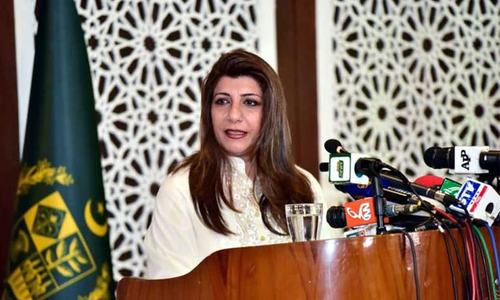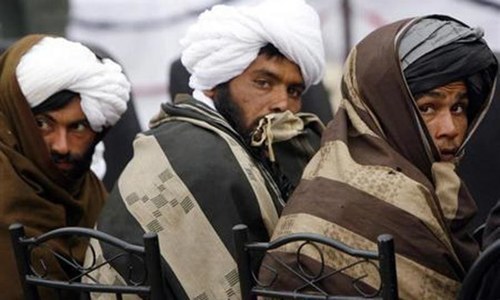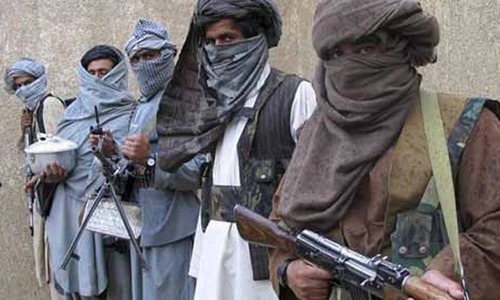KABUL: The US and the Taliban are set to sign a historic agreement that would pave the way to ending America’s longest war, the bitter foes announced on Friday, hours after Kabul said a week-long partial truce across Afghanistan would kick off this weekend.
If that so-called “reduction in violence” holds, it would mark a major turning point in the gruelling conflict and set the conditions for a deal that could, ultimately, pull US troops out after more than 18 years and launch Afghanistan into an uncertain future.
Both US Secretary of State Mike Pompeo and the Taliban issued statements saying they had agreed to sign the accord on Feb 29 in Doha, following the one-week partial truce.
“Upon a successful implementation of this understanding, signing of the US-Taliban agreement is expected to move forward,” Pompeo said, adding that negotiations between the Taliban and the Afghan government would “start soon thereafter”.
Afghanistan’s National Security Council spokesman Javed Faisal and Taliban sources had earlier said the “reduction in violence” between US, Taliban and Afghan security forces would begin on Saturday.
Afghan govt to hold talks with militants if ‘reduction of violence’ continues for a week; Pakistan welcomes the developments
Pakistan welcomed the announcements and expressed the hope that the parties concerned would seize the opportunity and work out an inclusive political settlement for durable peace in Afghanistan.
The United States has been in talks with the Taliban for more than a year to secure a deal in which it would pull out thousands of troops in return for Taliban security guarantees and a promise to hold peace talks with the government in Kabul.
A reduction in violence would show the Taliban can control their forces and demonstrate good faith ahead of any signing, which would see the Pentagon withdraw about half of the 12,000-13,000 troops currently in Afghanistan.
Afghan President Ashraf Ghani said the partial truce was to start at midnight on Friday-Saturday.
“Our next steps on the peace process will depend on the evaluation of the week of the reduction in violence,” Ghani, who this week secured a second term in office, said in a televised address.
“The Afghan security forces will remain on active defence status during the week.”
In their statement, the Taliban said warring parties would “create a suitable security situation” ahead of a deal signing.
The Taliban’s political spokesman, Suhail Shaheen, separately tweeted that the agreement would see “all” foreign forces leave Afghanistan.
But a senior US administration official stressed that any withdrawal would be “conditions-based”. And for now at least, the Pentagon wants to leave troops in Afghanistan on a counter-terrorism mission to fight elements such as those from the militant Islamic State group.
The reduction of US forces “is very much tied to delivery on the commitments that (the Taliban) have made,” the US official told reporters.
One Taliban source said that if an agreement was signed on Feb 29, talks between the Taliban and the Afghan government, needed to cement a broader peace deal, would be slated to start on March 10.
Stand down
In southern Kandahar province, which is seen as the Taliban’s heartland, one militant said he had received orders to stand down.
But another Taliban commander based in Kandahar, Hafiz Saeed Hedayat, said he had only been ordered to refrain from attacking major cities and highways.
“This means maybe the violence will continue in the districts,” Hedayat said.
The US and the Taliban have been tantalisingly close to a deal before, only to see President Donald Trump nix it at the eleventh hour in September.
Any truce comes fraught with danger, and the attempt to stem Afghanistan’s bloodshed is laced with complications. Warring parties could also exploit a lull to reconfigure their forces and secure a battlefield advantage.
The reduction in violence is “still just the first step”, Andrew Watkins, a senior analyst with the International Crisis Group, said. “Those talks will be a tough road of their own, but are the best avenue to peaceful settlement to Afghanistan’s conflict.”
On Thursday, the deputy leader of the Taliban said the insurgents were “fully committed” to a deal with Washington.
“That we stuck with such turbulent talks with the enemy we have fought bitterly for two decades, even as death rained from the sky, testifies to our commitment to ending the hostilities,” Sirajuddin Haqqani wrote in an opinion piece in the New York Times.
Haqqani is also head of the Haqqani network, a US-designated terrorist group that is one of the most dangerous factions fighting Afghan and US-led Nato forces in Afghanistan.
The international community hailed the announcements, with Nato saying the deal could make way for “sustainable peace” in Afghanistan, while Russia labelled it an “important event” for ending the war.
Islamabad’s stance
“Pakistan has consistently supported direct negotiations between the US and Taliban. From the outset, Pakistan has facilitated this process and contributed to its progress thus far,” said a statement by the Foreign Office spokesperson in Islamabad.
“We look forward to the signing of the agreement on 29 February, 2020.”
She said Pakistan believed the signing of the agreement would pave the way for the next step of intra-Afghan negotiations. “We hope the Afghan parties would now seize this historic opportunity and work out a comprehensive and inclusive political settlement for durable peace and stability in Afghanistan and the region,” she said.
She reaffirmed Pakistan’s support for a peaceful, stable, united, democratic and prosperous Afghanistan, at peace with itself and with its neighbours.
“We are also looking forward to the international community playing its part in reinforcing the efforts for the establishment of sustainable peace in Afghanistan and helping to create conditions inside Afghanistan to enable the return of Afghan refugees from Pakistan to their homeland with dignity and honour,” the spokesperson added.
Published in Dawn, February 22nd, 2020















































